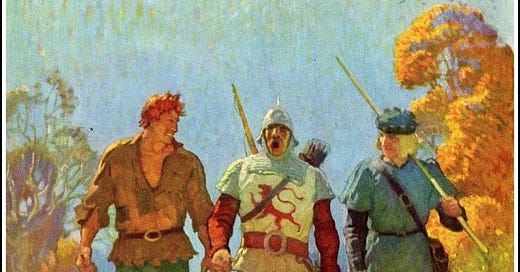Why You Should Read 'The White Company'
"Now order the ranks, and fling wide the banners, for our souls are God's and our bodies the king's, and our swords for Saint George and for England!"
No doubt, Sir Arthur Conan Doyle is best known for his beloved detective stories, but never suspect that the creative well runs dry with Sherlock Holmes. In fact, Doyle considered this historical fiction to be of much greater value than his Sherlock stories, and by that assertion he is not wrong.
The White Company chronicles the exploits of three friends in a free company of archers who move about western Europe during the Hundred Years’ War. Particularly, the book is set in England, France, and Spain being tethered to the events of 1366 and 1367, with the backdrop of Edward the Black Prince’s campaign to restore Peter of Castile to the throne. Though the fierce battles reflect “one of a thousand of which no chronicler has spoken and no poet sung. Through all the centuries and over all those southern waters nameless men have fought in nameless places, their sole monuments a protected coast and an unravaged country-side.”
In that regard, Doyle seems to have had a remarkably well-informed grasp of the spirit of the times; an era in which Heaven itself was perceived as being very near to the common man. When “God's direct agency was to be seen in the thunder and the rainbow, the whirlwind and the lightning. To the believer, clouds of angels and confessors, and martyrs, armies of the sainted and the saved, were ever stooping over their struggling brethren upon earth, raising, encouraging, and supporting them.”
In that spirit Doyle seems to have had the most fun on the topic of chivalry. Sir Nigel is truly a knight in shining armour and the spiritual ancestor to the quiet-suffering and stiff-upper-lip attitude which had come to caricaturize the British Isles. Nigel knows all too well that it’s the “small men and not the great who hold their noses in the air.” Nobility is not a birthright to this good knight, who is ever in search of a worthy wayside deed through which the order of chivalry may be advanced.
Nigel’s advice to the lovesick lad who is his squire: "Then must you strive to be worthy of her love. Be brave and pure, fearless to the strong and humble to the weak; and so, whether this love prospers or no, you will have fitted yourself to be honoured by a maiden's love, which is, in sooth, the highest guerdon which a true knight can hope for."
Though The White Company is said to have gained some limited popularity up to the second World War, this novel has been sadly under-appreciated for too many years. That being said, it is not an overstatement to say that The White Company is a true gem of western literature and that it deserves its place among the classics. Not only does this novel deliver on its promise to entertain the reader, but it offers a robust understanding and well-researched historical insight into those often-misunderstood Middle Ages.
“So they lived, these men, in their own lusty, cheery fashion--rude and rough, but honest, kindly and true. Let us thank God if we have outgrown their vices. Let us pray to God that we may ever hold their virtues.”







Great review!